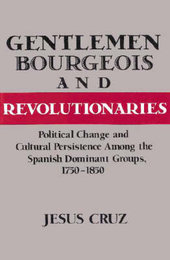
|
Gentlemen, Bourgeois, and Revolutionaries: Political Change and Cultural Persistence among the Spanish Dominant Groups, 1750-185
Paperback / softback
Main Details
| Title |
Gentlemen, Bourgeois, and Revolutionaries: Political Change and Cultural Persistence among the Spanish Dominant Groups, 1750-185
|
| Authors and Contributors |
By (author) Jesus Cruz
|
| Physical Properties |
| Format:Paperback / softback | | Pages:364 | | Dimensions(mm): Height 230,Width 152 |
|
| Category/Genre | World history - c 1500 to c 1750 |
|---|
| ISBN/Barcode |
9780521894166
|
| Classifications | Dewey:305.550946 |
|---|
| Audience | | Professional & Vocational | |
|---|
| Illustrations |
36 Tables, unspecified; 11 Line drawings, unspecified
|
|
Publishing Details |
| Publisher |
Cambridge University Press
|
| Imprint |
Cambridge University Press
|
| Publication Date |
29 January 2004 |
| Publication Country |
United Kingdom
|
Description
The traditional interpretation of the crisis of the Spanish Old Regime is of a revolution carried out by an ascendant bourgeoisie. Professor Cruz challenges this viewpoint, arguing that in Spain, as in the rest of Europe, a national bourgeoisie did not exist before 1850. Historiography based on the bourgeois revolution theory portrays Spain as an exceptional model whose main feature is the "failure" produced by the immobility of its ruling class. This work re-examines that understanding, and relocates Spain in the mainstream for industrialization, urbanization and democratization that characterize the history of Modern Europe.
Reviews"Jesus Cruz offers convincing evidence with regard to the political and economic elite of Madrid, who largely dominated early liberal politics...This is an unusually stimulating and original dissertation-book, based on extensive prosopographical research, that makes a distinctive contribution to the social history of Spain. It merits broad attention and should provoke extensive new discussion and research on modern elites in other parts of the country as well." Stanley G. Payne, Journal of Social History "This solidly researched monograph challenges conventional interpretations about the social and economic background of Spanish liberals...Through detailed analysis of family histories, Cruz has shown that the liberal revolution was accomplished by already well-established individuals who moved easily to dominate the institutions and economy of the liberal state...This study offers an original and well-researched interpretation of a complex question...It makes a positive contribution to the history of Spanish liberalism in its formative period." William J. Callahan, Canadian Journal of History "...the volume demands and deserves careful attention to appreciate its data and the arguments constructed thereon." Gary W. McDonogh, American Historical Review The work of Jesus Cruz constitutes a magnificent example of the analytical tensions produced in European historiography by the failure of the classic theory...of the bourgeois revolution." Isabel Burdiel, Journal of Modern History
|